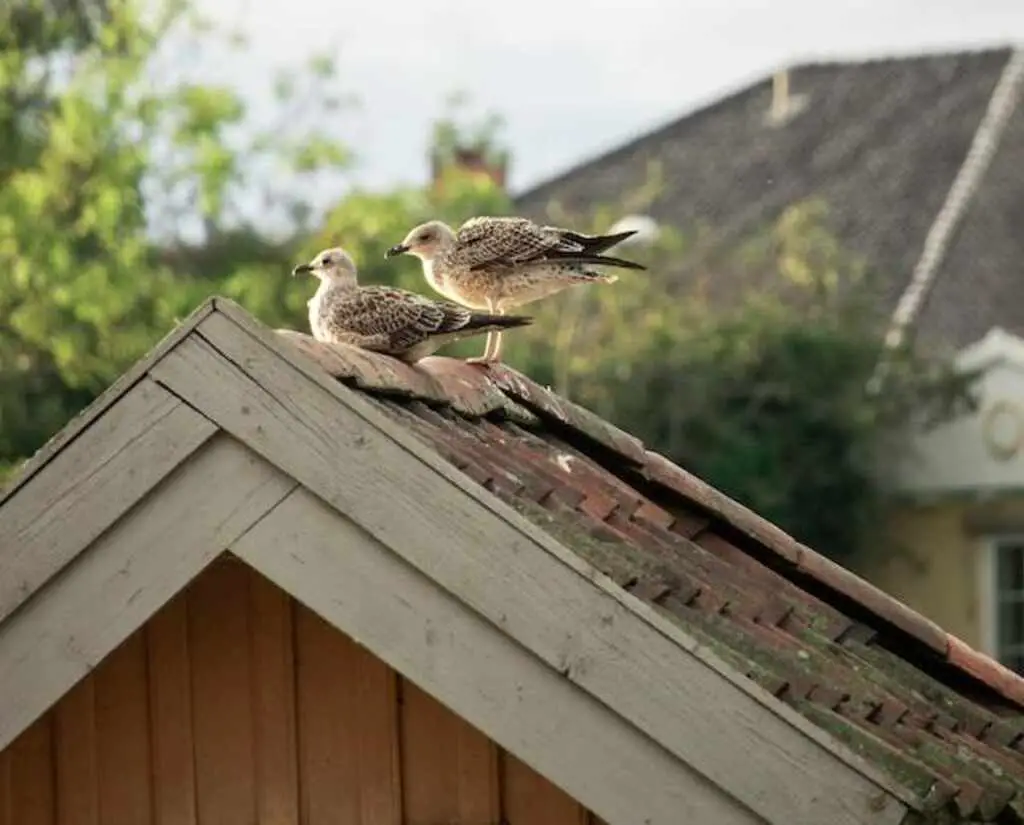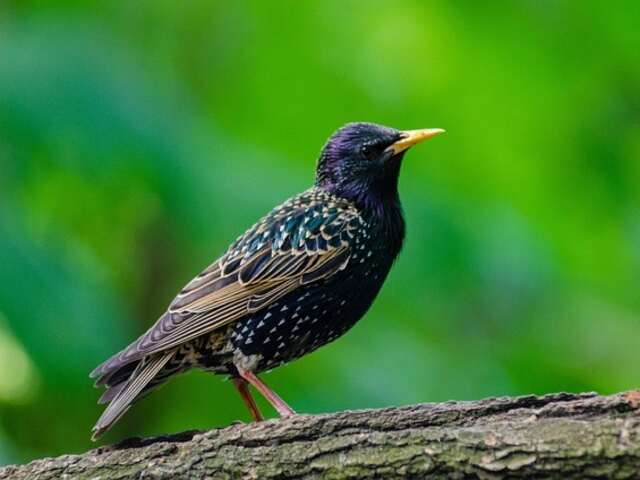Are you tired of waking up to the sound of chirping birds on your window sill or cleaning up bird droppings from your porch? Don’t worry, we’ve got you covered! In this article, we’ll share the short answer to the age-old question,
“How to Keep Birds Away From Your House?” But that’s not all, we’ll also dive into some fun and effective ways to keep pesky birds at bay. So, grab your birdseed and let’s get started!
Table of Contents
- 1 Why You Need to Keep Birds Away From Your Home
- 2 What You Need to Know About Different Types of Birds
- 3 Common Home-Visiting Bird Species
- 4 Identifying Problem Areas Around the Home
- 5 Understanding Bird Behavior to Determine the Best Solutions
- 6 Physical Barriers to Stop Birds Entering Your Home
- 7 Simple Solutions to Keep Birds Away From Your Home
- 8 Visual Deterrents to Scare Birds Away from Your Home
- 9 Audible Deterrents to Scare Birds Away from Your Home
- 10 Natural Solutions to Keep Birds Away From Your Home
- 11 Non-Toxic Solutions to Keep Birds Away From Your Home
- 12 Bird Traps
- 13 Removing Food Sources
- 14 FAQs: How to Keep Birds Away From Your House?
- 14.1 How can I prevent birds from building nests on my house?
- 14.2 What are some natural ways to keep birds away from my house?
- 14.3 What are some visual deterrents to scare birds away from my house?
- 14.4 Can sound deterrents effectively keep birds away from my house?
- 14.5 Are there any chemical solutions to keep birds away from my house?
- 14.6 How can I remove food sources to keep birds away from my house?
- 15 Conclusion
- 16 Author
Why You Need to Keep Birds Away From Your Home
Have you ever noticed birds making a mess in your garden, scaring away other wildlife, or even getting inside your house? If so, you may be wondering how to keep birds away from your home.
Keeping birds away from your home is important for a variety of reasons. Birds can cause damage to your home and garden, frighten other wildlife, and spread disease.
Fortunately, there are a number of simple solutions that can help you keep birds away from your home.
In this blog, we’ll look at why you need to keep birds away from your home and some of the best solutions for doing so.
What You Need to Know About Different Types of Birds
When it comes to keeping birds away from your home, it’s important to know what type of birds are trying to get inside. Different types of birds have different behaviors and require different solutions for prevention.
For example, some birds are more likely to be found nesting in trees, while others may be attracted to your roof or windows. Knowing which type of bird is causing the problem will help you find the most effective way to keep it away.
Another important factor to consider is the size of the bird. Larger birds, such as crows and ravens, are more likely to cause damage to your home, while smaller birds, such as sparrows, are less likely to do so. Knowing the size of the bird will help you determine the best way to keep it away.
Finally, it’s important to know the bird’s habits. Different birds have different feeding habits, nesting preferences, and migratory patterns.
Knowing what type of birds are in your area and their habits will help you find the most effective solutions for keeping them away.
Common Home-Visiting Bird Species
In this section, we will discuss the most common bird species that visit homes and the reasons why they do so. Understanding these reasons can help you develop effective strategies to keep these birds from causing damage or becoming a nuisance on your house.
Here are some of the most common nuisance bird species that you may want to keep away from your house:
Keep in mind that some of these birds are protected by law, so be sure to check local regulations before attempting to control their presence.
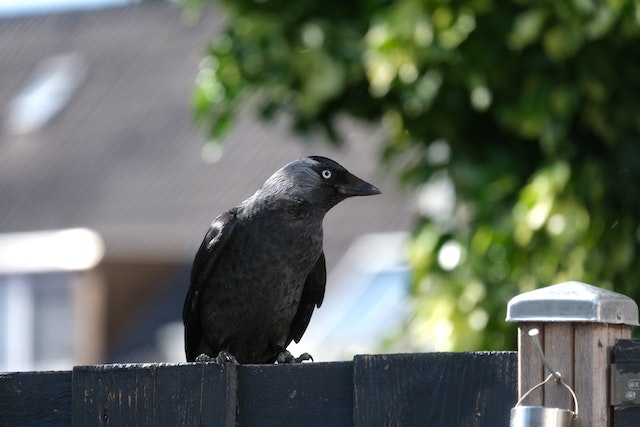
Identifying Problem Areas Around the Home
When it comes to keeping birds away from your home, it’s important to first identify problem areas. This means looking for entry points, like holes in your roof or open windows, that birds may be able to access.
You should also look for places birds like to nest, such as in gutters and eaves, and areas around your property where they may be able to find food.
Once you have identified problem areas, you can then start looking at solutions that will help you keep birds away from your home.
Understanding Bird Behavior to Determine the Best Solutions
When it comes to keeping birds away from your home, understanding their behavior can be key to finding the most effective solutions.
Different birds have different behaviors, so understanding what kind of birds are visiting your home, what they’re attracted to, and how they’re getting in can help you determine the best solutions to keep them away.
For example, some birds may be drawn to windows and balconies, while others may be attracted to food sources. Knowing which birds are visiting and why can help you devise the most effective plan to keep them out.
Additionally, understanding bird behavior can help you determine which solutions are more likely to be successful.
Some birds may be scared away by loud noises, while others may be more likely to be deterred by physical barriers.
By understanding bird behavior, you can determine which solutions are most likely to be successful in keeping them away from your home.
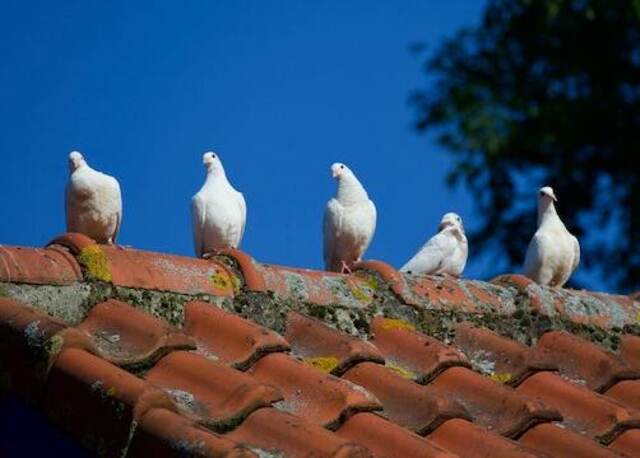
Physical Barriers to Stop Birds Entering Your Home
Physical barriers are an effective way to stop birds from entering your home. These can include installing netting or fine mesh over windows, doors, and other openings that birds may use to gain access.
Netting should be fitted securely and checked regularly to make sure it is still in place. You may also want to consider installing awnings, shutters, or other covers to further deter birds from accessing your home.
If you have trees that birds can use as a perch, you may want to trim them back and remove branches that are close to windows.
Additionally, you may need to fill in any gaps or crevices around doorways, windows, and other openings to prevent birds from squeezing through.
| Pros | Cons |
|---|---|
| Durable and long-lasting | Can be expensive to install |
| Provides a physical barrier | Can detract from the appearance of a home |
| Effective in preventing bird entry | May require professional installation |
| Can be customized to fit specific needs | May not be feasible for all areas of a home |
Simple Solutions to Keep Birds Away From Your Home
It is possible to keep birds away from your home without resorting to extreme measures. Simple solutions such as physical barriers, visual deterrents, audible deterrents and natural solutions can all help to keep birds away.
Physical barriers include things like netting or mesh to block birds from entering your home. Visual deterrents include things like fake owls, reflective surfaces and bright colors to scare birds away.
Audible deterrents include things like recordings of predator calls and bird distress calls. Natural solutions can include things like planting shrubs and trees that birds do not like, and providing nesting boxes for birds away from your home.
All of these simple solutions are effective and can help to keep birds away from your home.
| Pros | Cons |
|---|---|
| Inexpensive and easy to implement | May require regular maintenance |
| Safe for birds and the environment | May not be effective for all bird species |
| Can be aesthetically pleasing | May take time to see results |
| Can be used in combination with other methods | May require experimentation to find what works best |
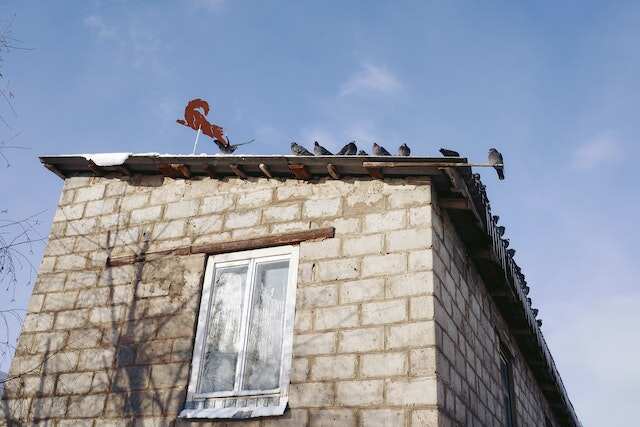
Visual Deterrents to Scare Birds Away from Your Home
One of the best ways to keep birds away from your home is to use visual deterrents. Visual deterrents rely on the birds’ natural instinct to be scared of what they don’t understand.
You can use visual deterrents in a variety of ways, from hanging shiny objects around your home to setting up fake predators.
Hang bright, reflective objects such as aluminum pie pans, CDs or old CDs, or even shiny ribbons around the home to scare away birds.
You can also set up fake predators, such as plastic owls, snakes, and hawks, to scare birds off. Some people even use balloons with eyes painted on them to scare away birds.
The key is to move the visual deterrents around regularly, so the birds don’t become accustomed to them.
| Pros | Cons |
|---|---|
| Can be inexpensive and easy to implement | May not be effective for all bird species |
| Safe for birds and the environment | May require regular maintenance |
| Can be aesthetically pleasing | May not work in all weather conditions |
| Can be used in combination with other methods | May lose effectiveness over time |
Audible Deterrents to Scare Birds Away from Your Home
Audible deterrents are an effective way to keep birds away from your home. This can be done by using devices that emit sounds that scare the birds away.
These devices can be set up around the perimeter of your home or near windows and other areas where birds are likely to enter.
Some of the sounds that are effective in scaring birds away include predator calls, distress calls, and ultrasonic devices.
Predator calls mimic the calls of birds’ natural predators, such as hawks and owls, and distress calls imitate the sounds of injured birds, which will cause the birds to flee.
Ultrasonic devices emit noises that are too high for humans to hear, but are loud and unpleasant to birds.
These devices can be set to operate on a timer or manually, and they can be used to keep birds away from your home.
| Pros | Cons |
|---|---|
| Can be effective in deterring birds | May be annoying to people and pets |
| Safe for birds and the environment | May not work in all weather conditions |
| Can be used in combination with other methods | May require regular maintenance |
| Can be customized to specific bird species | May lose effectiveness over time |
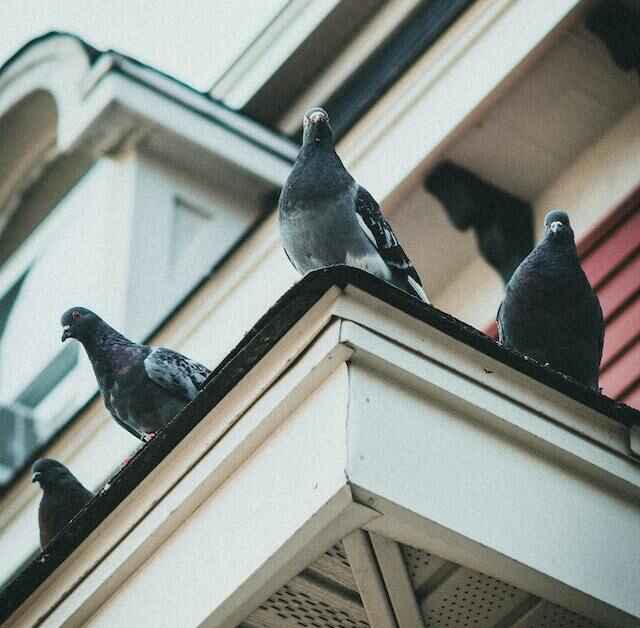
Natural Solutions to Keep Birds Away From Your Home
Natural solutions to keep birds away from your home are an effective way to get rid of the pesky birds without harming them or the environment.
One of the most common natural solutions is to block the birds’ access to food sources, such as bird feeders or open garbage cans.
If you have plants or trees near the house, you can make them less attractive to birds by trimming the branches and keeping them clean from debris.
You can also use bird netting to cover trees, plants, and other outdoor areas to keep birds away.
Another natural solution is to use bird scaring devices like hawk kites or owl decoys to frighten away birds.
Finally, you can also use natural predators to keep birds away, such as cats or owls. With these natural solutions, you can keep birds away from your home without harming them.
| Pros | Cons |
|---|---|
| Safe for birds and the environment | May not work in all situations or for all bird species |
| Can be effective in deterring birds | May require regular maintenance |
| Can be inexpensive and easy to implement | May take time to see results |
| Can be used in combination with other methods | May not be as effective as other methods |
Non-Toxic Solutions to Keep Birds Away From Your Home
Natural and non-toxic bird repellent sprays are an effective way to keep birds away from your home without the risks associated with chemical solutions. These sprays use natural ingredients to create unpleasant tastes or smells that birds find uncomfortable.
Examples of natural bird repellent sprays include peppermint oil, vinegar, garlic oil, and chili pepper spray. These can be applied to the area surrounding your swimming pool to create a barrier that birds will avoid.
It’s important to note that natural bird repellent sprays may need to be reapplied more frequently than chemical solutions, and may not be as effective in severe infestations.
However, they are a safe and environmentally friendly option for keeping birds away from your swimming pool.
Here’s a simple natural, non-toxic recipe for a homemade bird repellent spray:
Ingredients:
- 1 tablespoon cayenne pepper
- 1 tablespoon garlic powder
- 1 tablespoon white vinegar
- 1 tablespoon liquid dish soap
- 4 cups water
Instructions:
- In a mixing bowl, combine 1 tablespoon of cayenne pepper and 1 tablespoon of garlic powder.
- Add 1 tablespoon of white vinegar and 1 tablespoon of liquid dish soap to the bowl and stir to combine all the ingredients.
- Pour the mixture into a spray bottle.
- Add 4 cups of water to the spray bottle and shake well to combine all the ingredients.
- Spray the mixture onto areas of the house where birds are not supposed to be, such as around windowsills or ledges.
- Reapply the mixture after rain or as needed.
Note: Do not spray the mixture directly on birds or their food sources. Also, test the mixture on a small area of the house first to ensure that it does not cause any damage.
| Pros | Cons |
|---|---|
| Non-toxic and safe for use around children, pets, and other wildlife | May not be as effective as chemical solutions |
| Environmentally friendly and sustainable | May require more frequent reapplication |
| Generally easy to apply and use | May not work for all types of birds or situations |
| Can be used in a variety of locations, including indoor and outdoor areas | May have a strong smell that some people find unpleasant |
| Affordable and readily available | May not be as long-lasting as chemical solutions |
It’s important to note that the effectiveness of non-toxic bird repellent sprays may vary depending on the specific brand, type of bird, and environmental factors. It’s always a good idea to do your research and choose a product that is appropriate for your situation.
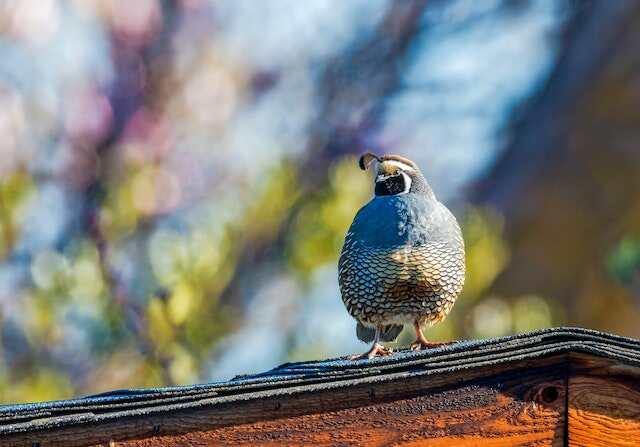
Bird Traps
Bird traps are an effective way to keep birds away from your home. Bird traps work by catching the birds in a safe way and then releasing them far away from your home. This is a humane way to get rid of problem birds without harming them.
The traps are often designed with perches or food that lure the birds in, and then close when the birds land on them.
This is an effective way to keep birds away from your home, but it’s important to use the traps responsibly and only if the birds are causing damage or a nuisance.
It’s also important to release the birds far away from your home so they don’t return.
| Pros | Cons |
|---|---|
| Can be effective in capturing and removing birds | May be harmful to birds if not used properly |
| Can be customized to specific bird species | May be illegal in some areas |
| Can be used to relocate birds to a more suitable habitat | May require a permit to use |
| Can be used in combination with other methods | May require regular maintenance |
Removing Food Sources
Removing food sources is another effective way to keep birds away from your home. Birds are naturally drawn to areas with food, so if you can remove the food source, you can reduce the number of birds in the vicinity.
This can be done by keeping your yard and garden free of food scraps or birdseed, or by keeping your windows and doors closed when cooking.
You can also use bird feeders in strategic locations away from your home, such as on the other side of your yard or in a secluded area of your garden.
This will keep the birds away from your home while still giving them a place to feed.
| Pros | Cons |
|---|---|
| Can be effective in deterring birds | May require changes in behavior or habits |
| Safe for birds and the environment | May take time to see results |
| Can be used in combination with other methods | May not be effective for all bird species |
| Can be a long-term solution | May require ongoing effort to maintain |
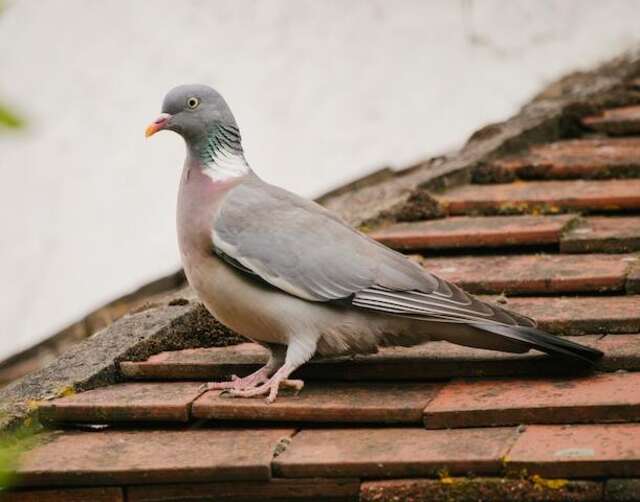
FAQs: How to Keep Birds Away From Your House?
How can I prevent birds from building nests on my house?
You can prevent birds from building nests on your house by installing bird spikes, netting, or other physical barriers. Also, make sure to seal off any openings or gaps in your home’s exterior.
What are some natural ways to keep birds away from my house?
Some natural ways to keep birds away from your house include using bird feeders, planting certain types of plants that repel birds, and using reflective surfaces to create a deterrent.
What are some visual deterrents to scare birds away from my house?
Visual deterrents that can scare birds away from your house include owl decoys, reflective tape or surfaces, and bird scare balloons.
Can sound deterrents effectively keep birds away from my house?
Yes, sound deterrents such as ultrasonic devices or bird distress calls can effectively keep birds away from your house.
Are there any chemical solutions to keep birds away from my house?
Yes, there are chemical solutions available such as bird repellent gels, sprays, and foggers. However, it’s important to use them carefully and according to instructions to avoid harming the birds or the environment.
How can I remove food sources to keep birds away from my house?
Remove any sources of food that may attract birds such as bird feeders, open trash cans, and outdoor pet food dishes. Keep your outdoor areas clean and free of debris.
Conclusion
In conclusion, keeping birds away from your home is possible with the right solutions.
Whether you use physical barriers, simple solutions, visual deterrents, audible deterrents, natural solutions, chemical solutions, bird traps, or by removing food sources, you can ensure that birds are prevented from entering your home.
By understanding the different types of birds, identifying problem areas around your home, and understanding bird behavior, you can choose the right solutions that work best for you and your home.
So don’t let birds be a nuisance – start using the right solutions today and keep them away from your home.

